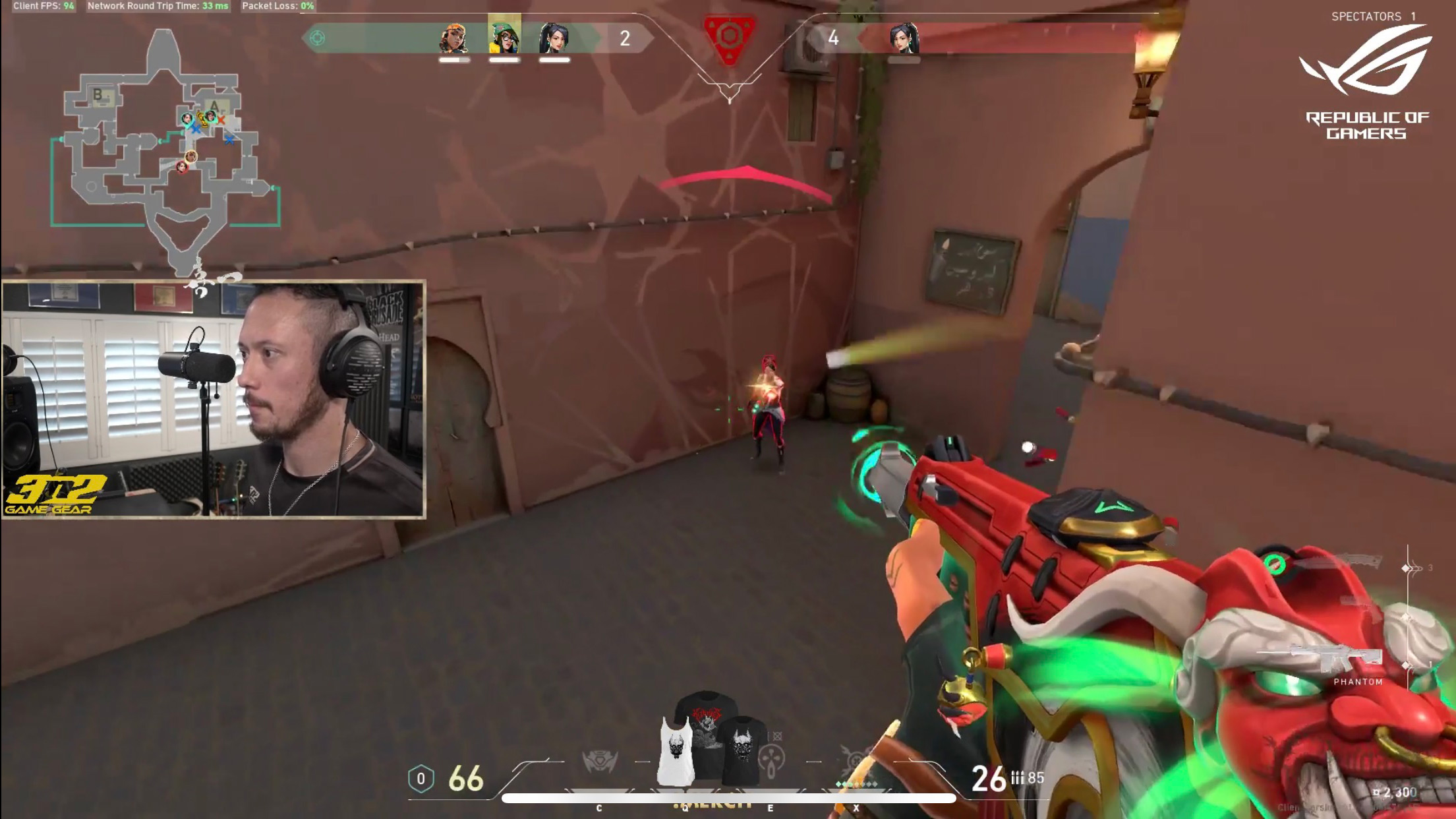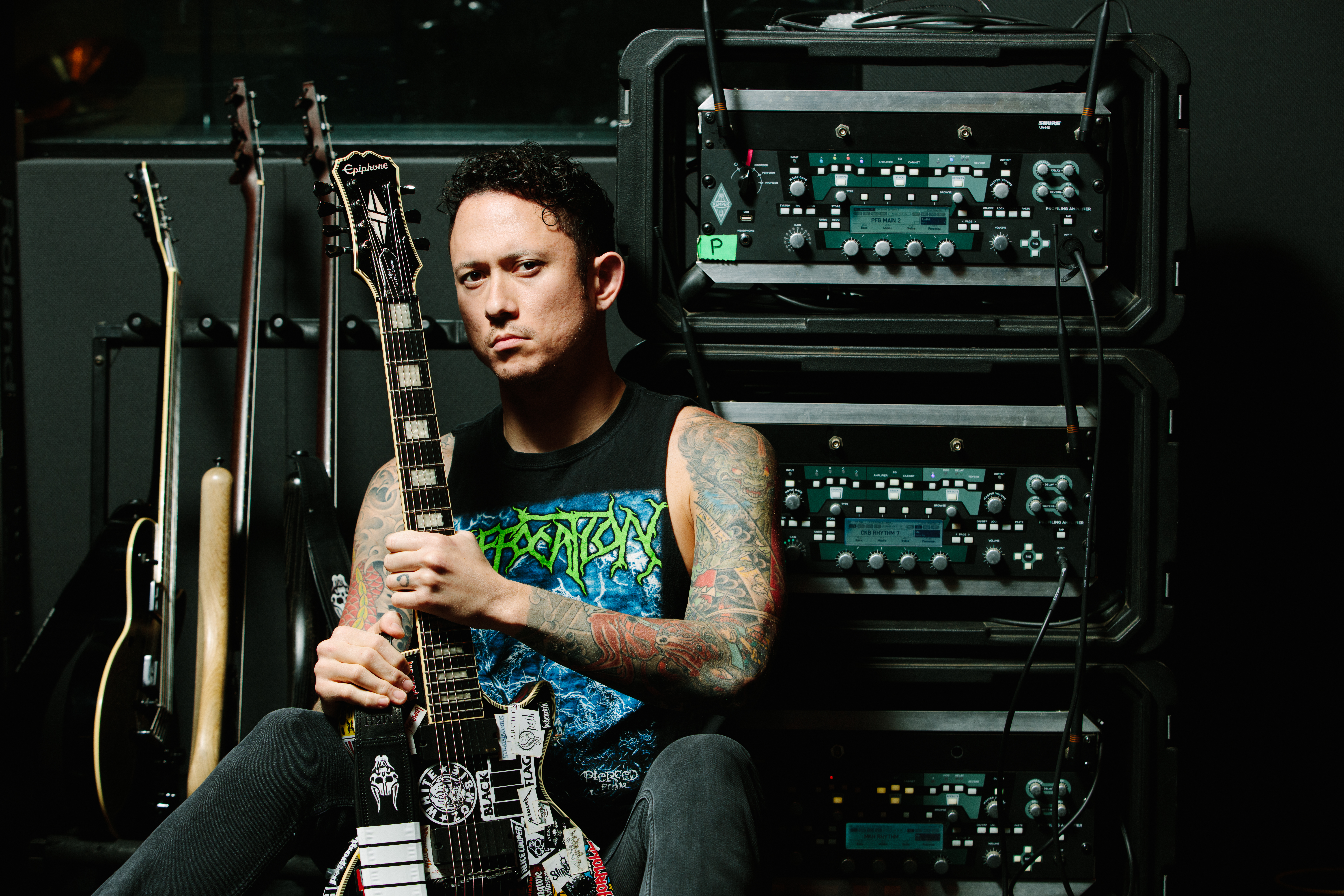For veteran metal singer Matthew K. Heafy, streaming merges life passions of music, gaming and community
Nowadays, it’s hard to find a millennial who’s spent most of their life in one job, but Matthew Kiichi Heafy has spent 21 years at his.
He’s 34.
The lead singer for metal band Trivium auditioned when he was 13, after he locked himself in his room and taught himself how to play guitar, winning the spot against high school kids with cars and tattoos, with “For Whom the Bell Tolls” by Metallica. He’s been with them ever since.
“When I heard the ‘Black’ album for the first time, I said to myself, ‘This is the kind of music I need to be playing. This is the kind of music I’m supposed to play in life.’”
And he’s stayed true to that revelation.
“For me, being in Trivium, making this kind of music, making metal for a living, I can see no other path,” he says.


Along the way, the band explored several sub-genres of metal, released nine studio albums and earned fans around the world. Four years ago, Heafy picked up another life-changing proficiency that became part of the job: streaming his music and gameplay, in the process constantly interacting with fans and other gamers.
When the touring world shut down this past spring, Heafy’s streaming channel was at the right place at the right time. With live music on hold, his faithful fan base migrated to Twitch to watch him practicing his formidable guitar skills or playing the game Valorant on his ASUS rig. He has a following of 177,000.
“We never thought we’d release a record that we wouldn’t actually be able to play in front of people live,” says Heafy, talking about the band’s latest album, “What the Dead Men Say.” They were given an option to delay due to the pandemic. “We said absolutely not because we wanted to give our fans that release, that escape, whatever they needed during this time. This record is so contemporary to the moment we live in right now. That’s why I’ve loved metal my entire life. It’s unafraid to tackle the dark things in life. And I feel only in doing that can you move on and become a happier person.”
Heafy, who was born in Japan to a Japanese mother and U.S. Marine dad who also loved music, has been gaming longer than he’s been speaking English. He was young – maybe three or four – when he played and beat the early Mario games on the first Nintendo console. He remembers his mother filming him beating those games, as well as early Mega Man, Metroid and Donkey Kong.
“So that’s like old school Twitch,” Heafy jokes.
The friends who turned him onto Twitch were John Howell (@memedude) and Brandon Kaupert (@vol1tion), who both worked at Twitch in partnerships at the time. They invited Heafy to headquarters while he was on a tour and they became good friends who turned into mentors for him. Both are still actively advising him on Twitch, with Howell taking on another role in Heafy’s extended family: his kids’ godfather.
When he first started streaming on Twitch, he was on PS4 playing Overwatch, and quickly he realized that there aren’t many streamers playing on consoles. Then a friend invited him over to play Overwatch together on his ASUS laptop. It was the first time he’d played with a keyboard and mouse since he was a kid playing the original Doom.
He posted a picture, tagged ASUS and offered to be a brand ambassador for them. At the time, he had maybe 5-20 viewers at all times concurrently for 20 minutes at a time. ASUS responded and sent him a laptop, so Heafy started streaming under their banner: ASUS Republic of Gamers (ROG).
“I keep it consistent because I love to do it and I love to entertain the people that are there. - Matt K. Heafy”
Heafy played Overwatch first on PC then Fortnite. He competed in a summer skirmish with well-known streamer Ninja, who stink bombed him live in front of 50,000 people.
Now Valorant is the main game he plays.
He’s learned a lot since then – including the value of adding music to the mix.
“I blew my voice out in 2014. I’ve been singing/screaming in the band since I was about 13 years old, since 1999. But I hurt my voice in 2014, and I had to unlearn everything, re-learn how to sing and scream, and in order for me to do that I needed to be practicing five to seven days a week, two to six hours a day,” Heafy says.
That meant he had less time to stream gaming on Twitch.
Around the three year mark into Twitch, some close friends encouraged him to start streaming those practice sessions. But he was skeptical.
“No one wants to watch that on Twitch. But my friends said, ‘Just try it, you’ll see.’”
Now, five days a week, Monday through Friday, at 9 a.m. and 3 p.m. (EDT) he streams music and gaming.
“I keep it consistent because I love to do it and I love to entertain the people that are there,” he says. “Twitch became my second job. The fact that we can make exactly what we make and want to make in the way we want to, and be able to make a living off of that, is everything to me.”

When he converted to PC gaming, he also came to appreciate Windows.
“It makes it work flawlessly and better than any other system. Talk to every streamer, they’re all using the same thing,” Heafy says. “I love the fact that it works day in and day out, because I have to have that reliability, I have to have my stream go off without a hitch. And I feel like in order to make that happen it really needs to be a Windows PC.”
Heafy’s main device for streaming at home is the ASUS ROG GL 12CM, a desktop tower. When he does tour again, he’ll be using the ASUS ROG Zephyrus Duo 15.
“For me, being a content creator, a live music streamer, what’s integral when you’re on the road is having chat interaction,” he says. “I’ve been using the second screen to chat and see alerts.”
Before getting the ROG Zephyrus Duo, he’d MacGyver his cellphone with duct tape to a hotel lamp so he could read alerts and see what was happening on the chat.
“For right now for me, the biggest thing is something as simple as seeing chats, but that is what the core foundation of Twitch is, the viewer/streamer interaction. So to have that ability right there with the secondary display on the ROG rig (or ROG Zephyrus Duo 15) has been huge for me,” he says.
All the engagement has been paying off. About a month ago, Trivium streamed a live show that 12,000 fans paid tickets to attend virtually, and more recently, 20,000 people attended a free show.
He has insights and opinions on what works and what doesn’t – at least for him.
“I feel that with live streaming, it’s not just a matter that a show is happening live. I feel like you have to understand what the medium is, and what it is that people like. And that’s why I love Twitch so much, because it’s about the streamer and viewer relationship,” Heafy says. “It’s not just watching someone do their thing and having zero interaction with the chat. You’re all linked together.”

Another advantage in migrating fans from one type of viewing experience to another: 21 years of building a community.
“One of the biggest tips I can give to other musicians about streaming would be to not wait. I tell them, start as soon as you can, even if it’s just off your cellphone or off a laptop. As you build your rig, you can stream days of you building your rig, building your custom PC, building your better streaming rig, but don’t wait,” Heafy says. “Whatever your schedule is that works for you is the right one, but it’s important to have an authentic relationship, engagement and to want to foster and to build a community.”
Streaming gives Trivium fans a new way to get closer to the band and see other sides of their life they normally wouldn’t.
The band’s fans have been able to see different aspects of Heafy’s life, up close and personal. For one thing he is father to toddler twins, who are often heard in the background head banging, singing, screaming and moshing to their dad’s music.
“It has absolutely been a blessing in disguise, being able to be with our kids and our family all the time. Being a touring musician, I was very afraid of having children because I thought I would be away a lot. My father was a Marine, so he was deployed during a lot of my really early years,” he says. “But I think I’ve only missed about three to five months of their entire life, which is pretty incredible.”
To relieve the stress of not touring and pandemic uncertainty, Heafy does Brazilian jujitsu, yoga and kettle bell workouts. He’s also recently picked up mace training. All are examples of ways to help fans cope, too.
A lot of work and dedication has gotten Heafy and the rest of Trivium to this point.
“It took a very long time. I’m seeing a lot of musicians come in now, expecting instant results, instant answers, instant partnerships, instant stream success. It really wasn’t until the world shut down that the channel really exploded,” Heafy says. “I look at it as a responsibility to keep these things going. So I’m happy that I’m able to keep people happy during all of this.”

